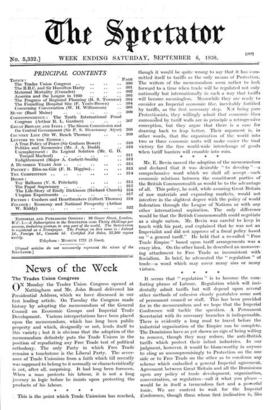Mr. E. Bevin moved the adoption of the memorandum and
declared that it was desirable " to develop "—a comprehensive word which we shall all accept—such economic relations between the constituent parties of the British Commonwealth as would be to the advantage of all. This policy, he said, while assuring Great Britain of raw materials and expanding markets, would not interfere in the slightest degree with the policy of world federation through the League of Nations or with any other international aspiration. The only difference would be that the British Commonwealth could negotiate as a single nation. Mr. Bevin was careful to keep in touch with his past, and explained that he was not an Imperialist and did not approve of a fiscal policy based on "a general tariff." He held that a so-called "Free Trade Empire" based upon tariff arrangements was a crazy idea. On the other hand, he described an unwaver- ing attachment to Free Trade as inconsistent with Socialism. In brief, he advocated the "regulation " of trade—a word which may cover many sins or many virtues. * * * *






























